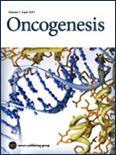
Oncogenesis
Scope & Guideline
Connecting the dots in cancer biology and treatment.
Introduction
Aims and Scopes
- Molecular Mechanisms of Cancer:
Research articles delve into the intricate molecular pathways that contribute to cancer initiation, progression, and metastasis, including studies on signaling pathways, genetic mutations, and epigenetic modifications. - Cancer Therapeutics and Resistance:
The journal publishes findings related to the development of novel therapeutic approaches, including targeted therapies and immunotherapies, as well as mechanisms of drug resistance that hinder treatment efficacy. - Cancer Stem Cells and Tumor Microenvironment:
A significant focus is placed on cancer stem cells, their role in tumor heterogeneity, and the influence of the tumor microenvironment on cancer progression and treatment response. - Advancements in Diagnostic and Prognostic Techniques:
The journal highlights innovative diagnostic tools and prognostic markers that facilitate early detection and personalized treatment strategies for various cancer types. - Translational Research and Clinical Applications:
Oncogenesis emphasizes studies that bridge laboratory findings with clinical applications, aiming to translate basic research into effective cancer treatments.
Trending and Emerging
- Targeting the Tumor Microenvironment:
Research is increasingly focusing on the tumor microenvironment and its role in cancer progression, therapy resistance, and immune evasion, highlighting the importance of understanding the interactions between tumor cells and their surrounding stromal cells. - Cancer Metabolism and Bioenergetics:
There is a growing trend towards investigating the metabolic reprogramming of cancer cells, with studies exploring how alterations in metabolism contribute to tumor growth and therapeutic resistance. - Immunotherapy and Immune Checkpoint Inhibition:
The exploration of immunotherapeutic strategies, particularly immune checkpoint inhibitors, is rapidly expanding, with research dedicated to understanding mechanisms of action, resistance, and combination therapies. - Precision Medicine and Personalized Therapy:
The journal is witnessing an increase in studies aimed at developing personalized treatment strategies based on genetic and molecular profiling of tumors, paving the way for more effective and tailored therapies. - Role of Non-Coding RNAs in Cancer:
Emerging research on the functional roles of non-coding RNAs (such as microRNAs and long non-coding RNAs) in cancer biology is gaining traction, providing insights into their potential as therapeutic targets and biomarkers.
Declining or Waning
- Traditional Chemotherapy Studies:
Research focused solely on traditional chemotherapy regimens is becoming less prevalent, as newer targeted therapies and immunotherapies gain prominence in cancer treatment, leading to a reduced emphasis on conventional approaches. - Single Agent Studies:
There is a noticeable decrease in publications centered around the efficacy of single-agent treatments, as the field increasingly prioritizes combination therapies that enhance treatment outcomes and reduce resistance. - Basic Histopathological Studies:
Basic histopathological studies that do not integrate molecular or genetic insights are being overshadowed by more comprehensive approaches that utilize multi-omics and systems biology to understand cancer biology. - Epidemiological Studies without Molecular Insights:
Epidemiological studies that lack a molecular component are becoming less frequent, as the emphasis shifts toward understanding the biological mechanisms driving cancer disparities and outcomes.
Similar Journals

Cancer Research Communications
Advancing the frontiers of cancer knowledge.Cancer Research Communications is an esteemed journal published by the American Association for Cancer Research, a leading organization in the field of oncology. This journal aims to advance knowledge in cancer research through the dissemination of high-quality, peer-reviewed articles that cover a wide range of topics related to cancer biology, treatment modalities, and prevention strategies. As an open-access journal, Cancer Research Communications ensures that vital research findings are accessible to a global audience, promoting collaboration and innovation within the scientific community. The journal serves as a crucial platform for researchers, professionals, and students to share their insights and foster the exchange of effective cancer therapies and methodologies. With a commitment to excellence, it plays a significant role in shaping the future of cancer research and therapeutic development.

Cancer Cell International
Exploring New Horizons in Cancer TreatmentCancer Cell International, published by BMC, is a transformative open-access journal established in 2001, dedicated to advancing the field of oncology and cancer research. With its ISSN number not specified and an E-ISSN of 1475-2867, the journal proudly operates from the United Kingdom, located at CAMPUS, 4 Crinan St, London N1 9XW, England. Renowned for its rigorous peer-review process, Cancer Cell International has made significant strides, securing a Q2 ranking in Cancer Research and Q1 rankings in both Genetics and Oncology as of 2023. It ranks impressively in Scopus, featuring in the top quintile of Genetics (#37/347) and Oncology (#52/404), indicating its importance within the scientific community. The journal's broad scope caters to a diverse array of topics within cancer biology, making it an invaluable resource for researchers, professionals, and students seeking to stay at the forefront of cancer science. With a commitment to disseminating high-quality research, Cancer Cell International invites scholars to explore innovative findings and contribute to the collective effort of combating cancer.

CARCINOGENESIS
Elevating Knowledge in the Fight Against CancerCARCINOGENESIS, published by Oxford University Press, is a premier journal dedicated to the nuanced field of cancer research. With an ISSN of 0143-3334 and an E-ISSN of 1460-2180, this esteemed journal plays a crucial role in disseminating high-quality research findings since its inception in 1980, making it a cornerstone in the exploration of carcinogenic processes. As of 2023, it stands out with a commendable Q2 ranking in Cancer Research and a Q1 ranking in Medicine (miscellaneous), reflecting its significant impact in advancing knowledge in these vital areas. Supported by a strong Scopus ranking, specifically holding the 61st position out of 230 in Biochemistry, Genetics, and Molecular Biology within Cancer Research, CARCINOGENESIS provides researchers, healthcare professionals, and students access to peer-reviewed articles that cover a broad spectrum of topics related to cancer etiology, prevention, and treatment. Although it is not an open-access journal, its commitment to excellence ensures that every published article contributes meaningfully to the global fight against cancer, making it an essential resource for those engaged in cutting-edge cancer research.

Molecular & Cellular Oncology
Unraveling the complexities of cancer biology.Molecular & Cellular Oncology, published by Taylor & Francis Inc, is a vital academic journal dedicated to the exploration of cancer biology through the lens of molecular and cellular mechanisms. Since its inception in 2014, the journal has played a crucial role in disseminating innovative research findings that address the fundamental aspects of cancer research and molecular medicine. With its current ranking in Scopus placing it in the Q3 quartile for both Cancer Research and Molecular Medicine, the journal provides a platform for groundbreaking studies that push the boundaries of our understanding of oncogenesis and therapeutic interventions. Although the journal operates under a subscription model, its dedication to high-quality peer-reviewed research makes it an essential resource for researchers, professionals, and students aiming to contribute to or stay updated in the rapidly evolving field of oncology. As we approach the culmination of its converged years in 2024, Molecular & Cellular Oncology aims to continue fostering collaborations and insights that advance cancer research on a global scale.
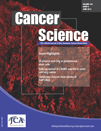
CANCER SCIENCE
Leading the charge in innovative cancer treatment solutions.Cancer Science, an esteemed journal published by Wiley, stands at the forefront of oncology research, boasting an impressive impact factor and a classification in the Q1 category for its contributions in Cancer Research, Medicine, and Oncology as of 2023. Since its inception in 2003 and transitioning to an Open Access model in 2014, the journal has facilitated global dissemination of critical research findings, ensuring that vital information remains accessible to researchers, clinicians, and students alike. With its comprehensive scope covering cutting-edge discoveries in cancer biochemistry, genetics, and molecular biology, Cancer Science is recognized for its rigorous peer-review process and significant contributions to advancing our understanding of cancer. The journal, located at 111 River St, Hoboken, NJ, is an essential resource for anyone dedicated to improving treatment outcomes and pushing the boundaries of cancer research.
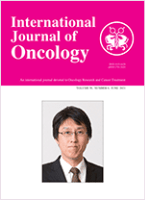
INTERNATIONAL JOURNAL OF ONCOLOGY
Shaping the future of cancer care through knowledge.INTERNATIONAL JOURNAL OF ONCOLOGY is a leading academic publication dedicated to advancing the field of cancer research and treatment. Published by SPANDIDOS PUBL LTD in Greece, this journal, with ISSN 1019-6439 and E-ISSN 1791-2423, has established itself as a reputable source of peer-reviewed articles since its inception in 1993. With an impressive Q2 ranking in both Cancer Research and Oncology categories, as well as high Scopus ranks reflecting its significant contribution to the fields of Medicine and Biochemistry, the journal offers a platform for researchers, clinicians, and students alike to disseminate their findings and engage in dialogue surrounding innovative practices and breakthroughs. Although the journal follows a traditional subscription model, it continues to attract a diverse readership interested in the latest developments in oncological research, providing essential insights into cancer biology, therapeutics, and patient care. With a commitment to excellence, the INTERNATIONAL JOURNAL OF ONCOLOGY plays a vital role in shaping the future of oncology research and is a must-read for anyone passionate about advancing cancer treatment and prevention.
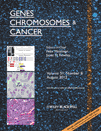
GENES CHROMOSOMES & CANCER
Bridging Genetics and Cancer for a Healthier Tomorrow.GENES CHROMOSOMES & CANCER, published by Wiley, is a premier journal in the intertwined fields of cancer research and genetics. With an ISSN of 1045-2257 and an e-ISSN of 1098-2264, this journal has been a significant outlet for innovative research since its inception in 1989, continuing through to 2024. Positioned in the Q2 quartile of both Cancer Research and Genetics categories in 2023, it reflects a strong impact in the scientific community, as evidenced by its Scopus rankings—99th in Genetics and 83rd in Cancer Research. Though it does not provide open access options, GENES CHROMOSOMES & CANCER offers valuable insights that foster collaboration and discovery among researchers, professionals, and students dedicated to understanding the genetic underpinnings of cancer. With its reputable standing, this journal is a vital resource for those aspiring to contribute meaningful advancements in cancer genetics and therapeutic interventions.
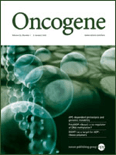
ONCOGENE
Pioneering Genetic Discoveries in OncologyONCOGENE is a premier peer-reviewed journal published by SpringerNature, serving as a crucial platform for innovative research within the fields of Cancer Research, Genetics, and Molecular Biology. With an impressive Impact Factor and a distinguished Q1 ranking across major categories, ONCOGENE publishes cutting-edge studies aimed at unraveling the complexities of cancer biology and genetic mechanisms. The journal has been a vital resource for the academic community since its inception in 1987, and it continues to foster rigorous scientific discussions and collaborations. Researchers, professionals, and students can access a wealth of critical insights and advances in cancer genomics and therapeutic approaches, cementing ONCOGENE’s role as a leading voice in the landscape of biomedical research. For comprehensive academic research, ONCOGENE remains an indispensable source of knowledge with contributions that significantly impact the evolution of cancer research and treatment strategies.

Advances in Cancer Biology-Metastasis
Connecting Research to Real-World Impact.Advances in Cancer Biology-Metastasis is an emerging journal published by Elsevier, aimed at advancing our understanding of the complexities of cancer biology, with a specific focus on the mechanisms and pathways related to metastasis. With an E-ISSN of 2667-3940, this journal offers a platform for researchers, professionals, and students in the fields of Cancer Research and Cell Biology to disseminate innovative findings and discuss novel therapeutic approaches. Though currently classified in the Q4 quartile across both Cancer Research and Cell Biology categories, the journal aspires to enhance its impact through rigorous peer review and high-quality publication. Positioned to cover the years from 2021 to 2024, it seeks to bridge gaps in foundational knowledge and promote collaborative research efforts that could pivot the current understanding of cancer metastasis. Researchers are encouraged to take advantage of this platform to advocate for advancements in cancer biology, making significant contributions that can influence both academic and clinical practices.
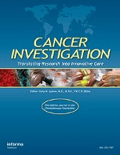
CANCER INVESTIGATION
Illuminating pathways in oncology through peer-reviewed excellence.CANCER INVESTIGATION is a distinguished peer-reviewed journal published by Taylor & Francis Inc, dedicated to the advancing field of cancer research and oncology. With an ISSN of 0735-7907 and E-ISSN of 1532-4192, this journal has been a pivotal resource for professionals and researchers since its inception in 1983, continually contributing to the evolving landscape of cancer investigation until its convergence in 2024. CANCER INVESTIGATION boasts noteworthy rankings in 2023, including Q3 in Cancer Research and Q2 in Medicine (miscellaneous), highlighting its relevance and impact in these critical areas. The journal's commitment to disseminating innovative research and comprehensive reviews makes it an essential platform for those engaged in cancer studies and related disciplines. While currently not available as an open-access publication, CANCER INVESTIGATION remains an invaluable tool for understanding the complexities of cancer, offering insights that drive scientific advancements and improve patient outcomes.